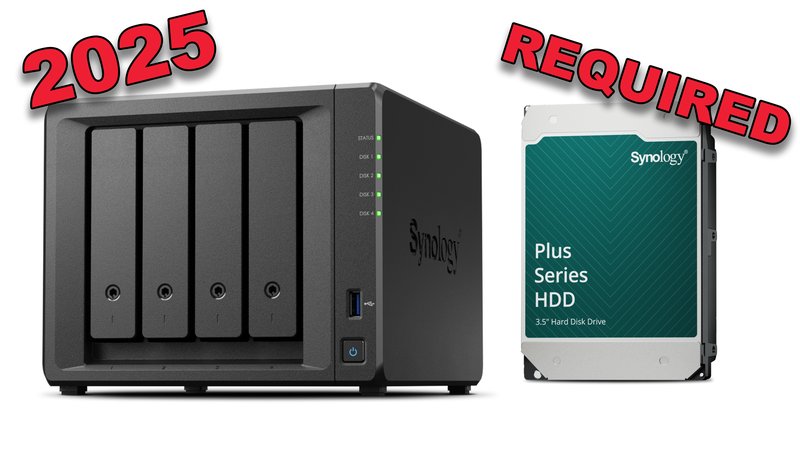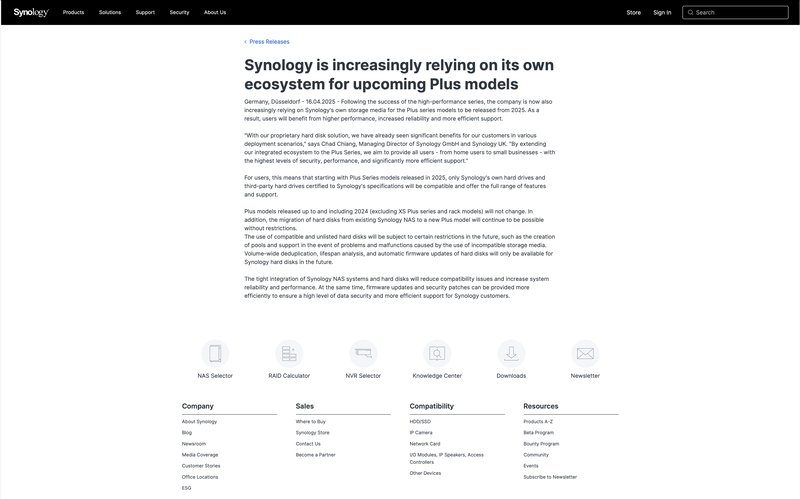Synology requiring drives on all 2025 models
Synology has released a blog post stating that they will be requiring drives on all 2025 Plus models. This has been a huge shift from the old rules

Overview
There has been a new news post out of Synology Germany, which openly states that all 2025 Synology Plus models will begin requiring Synology drives. Previously this was only saved for NAS units with 12 bays or above, however now it seems as though this will be required by plus units. This is a huge shift as it really locks down what you can do with your Synology NAS.

Note: This text was originally in German and has been translated by a bot, rather than a professional translator. Link
YouTube Video:
Full Translated Text
This is a translation of the Synology Germany news article
Germany, Düsseldorf - 16.04.2025 - Following the success of the high-performance series, the company is now also increasingly relying on Synology's own storage media for the Plus series models to be released from 2025. As a result, users will benefit from higher performance, increased reliability and more efficient support.
"With our proprietary hard disk solution, we have already seen significant benefits for our customers in various deployment scenarios," says Chad Chiang, Managing Director of Synology GmbH and Synology UK. "By extending our integrated ecosystem to the Plus Series, we aim to provide all users - from home users to small businesses - with the highest levels of security, performance, and significantly more efficient support."
For users, this means that starting with Plus Series models released in 2025, only Synology's own hard drives and third-party hard drives certified to Synology's specifications will be compatible and offer the full range of features and support.
Plus models released up to and including 2024 (excluding XS Plus series and rack models) will not change. In addition, the migration of hard disks from existing Synology NAS to a new Plus model will continue to be possible without restrictions.
The use of compatible and unlisted hard disks will be subject to certain restrictions in the future, such as the creation of pools and support in the event of problems and malfunctions caused by the use of incompatible storage media. Volume-wide deduplication, lifespan analysis, and automatic firmware updates of hard disks will only be available for Synology hard disks in the future.The tight integration of Synology NAS systems and hard disks will reduce compatibility issues and increase system reliability and performance. At the same time, firmware updates and security patches can be provided more efficiently to ensure a high level of data security and more efficient support for Synology customers.
Synology Germany
What has changed?
Synology started off in life as being an incredibly open product. Add whatever drives you want to one of their shells and simply build a file system. This is where they got a ton of their user base. However in the past few years Synology has been restricting out the products and pieces that you can add in to your NAS. It started roughly 5 years ago when Synology started requiring their own drives in their larger XS units, which were really target toward businesses. But during this time they did not pose this requirement on anything on the "personal" level size. This made sense, make the money from the larger more expensive NAS units who businesses are using and want the support for, but then let home users do whatever they want, capturing both markets.
However they have now changed over to requiring all plus model NAS units 2025 and beyond, which has been a massive shift for their loyal home / small business audience.
What does this mean to you?

Now if you would like to purchase one of the upcoming Synology models like the DS925+, DS1825+, or the DS1525+ they all seem as through you will have to buy at least Synology Plus Series hard drives with them. Otherwise your volume will show as warning or error.
While currently these hard drives are actually cheaper then their IronWolf counterparts, they are limited in a few key areas, including total size (max at 16TB) and also have the ability for synology to simple lock them out of the entire market.
This really shows that Synology is moving in the direction of being a closed down product, really focusing on the business and enterprise markets